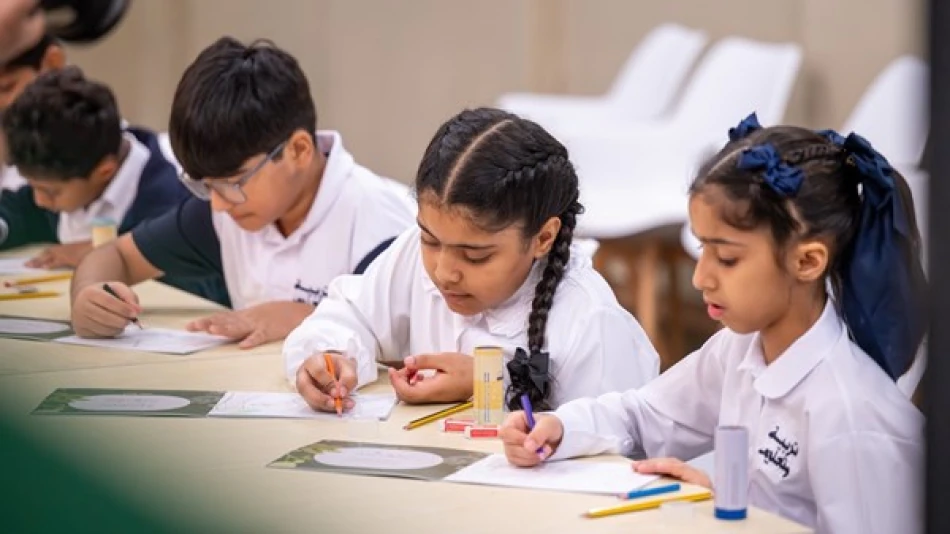
Educational and Cultural Workshops Captivate Audiences at the 'Al-Badr Festival'
UAE's Al Badr Festival Bridges Ancient Traditions with Contemporary Cultural Exchange
The fourth edition of the Al Badr Festival in Fujairah has evolved into a sophisticated cultural platform that demonstrates how traditional arts can foster international dialogue. Through workshops spanning Islamic calligraphy, Chinese embroidery, and historical exhibitions, the festival is positioning itself as a model for cultural diplomacy in an increasingly interconnected world.
Educational Workshops Drive Cultural Understanding
The festival's fifth day launched with targeted educational programming at the Fujairah Creative Center, beginning with a workshop titled "Drawings and Poems in Love of the Chosen One." Organized in collaboration with the Arabic Poetry House in Fujairah, the session engaged children and school students through the works of renowned Arab poets including Ahmed Shawqi, Jamal Al-Mulla from Oman, and Abdullah Al-Baradouni from Yemen.
The workshop's approach—combining visual arts with classical poetry—reflects a broader trend in Middle Eastern cultural institutions toward experiential learning. By creating a dedicated book of selected poems about the Prophet's biography, organizers ensured the educational impact extends beyond the event itself.
Cross-Cultural Artistry Takes Center Stage
Chinese artist Lin Wang's workshop on "Needle Across a Thousand Years" introduced participants to Bian Shou, a traditional embroidery art form originating in Kaifeng during the Song Dynasty over 1,000 years ago. The hands-on demonstration of traditional stitching patterns exemplifies how cultural festivals can serve as bridges between civilizations.
This type of cultural programming mirrors successful initiatives in Singapore and the UAE's broader cultural strategy, where traditional crafts become vehicles for international engagement. The workshop format allows for immediate skill transfer while fostering appreciation for artistic heritage that might otherwise remain confined to academic circles.
Historical Exhibitions Offer Immersive Experiences
The festival's exhibition component demonstrates sophisticated curatorial thinking through "Glow of Maqamat," which documents daily life in Abbasid-era Baghdad through 12 detailed miniature paintings by artist Yahya bin Mahmoud. The inclusion of interactive film material creates a multi-sensory experience that brings historical narratives to contemporary audiences.
This approach aligns with global museum trends toward immersive storytelling, similar to successful exhibitions at institutions like the Museum of the Future in Dubai or the Asian Civilisations Museum in Singapore.
Contemporary Islamic Art Gains Platform
The Al Burda Prize exhibition, organized in collaboration with the Ministry of Culture, showcases contemporary interpretations of Islamic artistic traditions. By pairing traditional Islamic art forms with modern techniques, the exhibition addresses a critical challenge facing cultural institutions: maintaining relevance while preserving authenticity.
The festival also displays winning works from the third edition of the Al Badr Prize, creating a continuous cycle of artistic recognition and development that could serve as a model for other regional cultural initiatives.
Strategic Cultural Diplomacy in Action
The Al Badr Festival's programming reflects the UAE's broader strategy of using cultural initiatives to strengthen international relationships and project soft power. By featuring Chinese traditional arts alongside Islamic calligraphy and Arabic poetry, the festival creates natural opportunities for cultural exchange that extend beyond mere appreciation to active learning and skill development.
For cultural institutions globally, the festival demonstrates how traditional art forms can be packaged for contemporary audiences without losing their essential character. The emphasis on hands-on workshops, rather than passive observation, suggests a more sustainable approach to cultural preservation and transmission.
The festival's success in attracting visitors from both within and outside Fujairah indicates growing appetite for authentic cultural experiences in an era of digital saturation. This trend presents opportunities for other regions to develop similar programming that celebrates local heritage while fostering international dialogue.
Most Viewed News

 Layla Al Mansoori
Layla Al Mansoori






